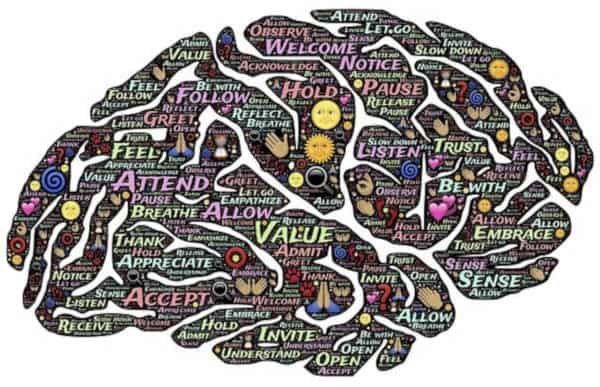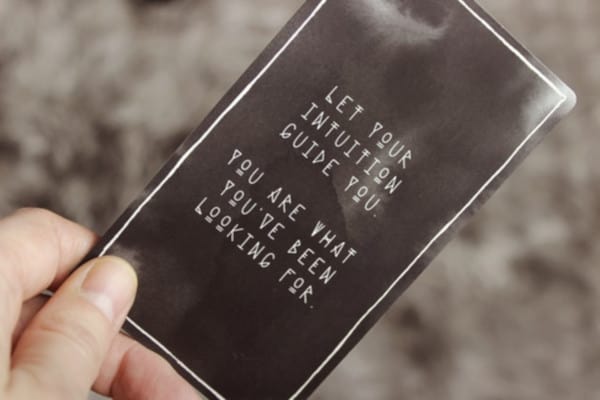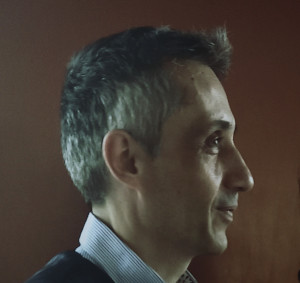Have you ever had a gut feeling that you should do something, only for it to later pay off? This gut feeling is often referred to as intuition, and countless people can swear by its benefits. People use this gut feeling in almost every sphere of their lives, yet, it goes against everything they know or have learned.
Just what is intuition, and what role does it play in your life?
Before delving into the meaning of intuition and the impact it has on your life, let’s first look at how most people make a decision.
Various factors go into every decision you make. Sure, you may not actively think of how many steps your bathroom is from your bed, but this information is recorded in your subconscious.
That is why it is easy to wake up in the middle of the night and head straight for the washrooms in total darkness. Unless through external factors, you’ll rarely make your way to the bathroom, only to find yourself opening the main door.
This is often understood by most people, so let’s look at sports fans for a better illustration. If you look at most fans, they will often base their decision based on their feelings. While most of the time, the decisions you make are based on your emotions, sports fans have a tendency of taking it a bit to the extreme.
For instance, you’ll come across a fan who is convinced their team will win a challenge against an opposing side. This is even when the data is in favor of the opponents. Most betting firms thrive on this fact –that a sports fan will choose their team despite other considerable factors.
Sports fans are not the only ones affected by this gut feeling. When you decide to phone a friend with no apparent reason other than, you just ‘felt like it,’ that’s intuition in play. When you decide to take an alternate route to work just because you felt like it, that’s also intuitive.
There’s a whole science behind how you make every decision; however, when you bring intuition, meaning you choose to trust your gut, you often bypass the decision-making process.
By now, you are likely trying to recall the times you have used intuition to make a decision. As you will soon realize, there are more times than you actually remember.
This begs the question, what is the intuition scientific explanation, and more importantly, are there benefits to following your intuition? Here is everything you need to know about intuition.
What is intuition?
While the examples above paint a clear picture, the simplest way to explain intuition is the aptitude to understand something specific instinctively, and without the need for conscious reasoning.
A key point to note in this explanation is the last bit, ‘without the need for conscious reasoning’ as it plays a key role in understanding intuition meaning in your life and decision-making process.

Is intuition spiritual?
When people talk of spirituality, the topic often derails to religion. While this understanding of however, spirituality can be best described as being focused or concerned with your spirit –or soul, as opposed to physical material. In simpler terms, it is the sense of connection people feel to something bigger than just themselves, something that connects everyone.
Spirituality is not just a deep connection of people, but it is a pool where all information, knowledge, and wisdom are stored. From this understanding, it’s easy to see why intuition is linked to spirituality.
This way, spirituality is like the internet. Every day, billions of people are feeding their experience and wisdom into the internet through various platforms.
Now, let’s say you want to learn a task such as cooking a dish. Instead of going through the tedious process of trial and error, you can just log onto a platform on the internet and look up recipes.
When you look at intuition from the spiritual point of view, it begins to clear up. Of course, there is not a sort of internet where you can look up whether to call a friend or not.
However, this argument is based on the assumption that, since everyone is connected, it is possible to share the information one person knows and pass it to another person.
To take it a step further, this understating of spirituality also shows that besides everyone being connected and able to share information, the process is also timeless. This basically means that every thought that has ever been conceived at any time –past, present, and future is in this information pool.
Therefore, when you have an intuitive feeling or thought, it is really based on the experience of another person or people in the past, present, or future.
For example, when you decide to use an alternative route to work intuitively, it is not just a decision out of thin air. On the contrary, it is a decision made from drawing from the pool of experience from people who have used that route and feel it would be best.
Since this delves into spheres not wholly covered by science, there’s little science backing it, and most scientists advise you to take this information with a grain of salt.
From the anecdotal point of view, there are numerous accounts of people who share stories of how they were saved by a gut feeling.

Is your gut feeling scientific?
Saying that everything backed by science is accurate would not only be presumptuous; it would also be incorrect. However, the bottom-line to science is cold hard evidence, and the results are evident.
To understand the connection between your gut feeling and science, you first need to look at the brain and how it functions. According to several studies, it takes far more effort to forget something than it is to remember it.
You may now be questioning why then it is difficult to remember every answer on the test. According to the research carried on the brain and memory, your brain records everything. However, if you think about it, remembering everything you’ve ever seen, heard, experienced, touched, and smelled would be overwhelming for your brain.
Thus, the brain creates a filter, keeping the most relevant information in the conscious part. The subconscious part of the brain then proceeds to store the rest of the information until a time when it is needed. This is why you may not recall ever watching a movie, but when you start watching it again, you start remembering everything.
The subconscious part of the brain is triggered to retrieve the stored information concerning the movie, and it all becomes clear. In some cases, however, there might be a disparity between perception and memory, which then creates a feeling of déjá Vu.
Related reading: How Our Conscious and Subconscious Mind Work – Opens in new tab
If your brain has the ability to capture all the information passed on to it through the various senses, it does help tie in your gut feeling to science. Look at it this way, one day, you’re headed to work, and everything is okay. Then, an hour later, a colleague gets to work.
While taking coffee, probably on your phone browsing, the late coworker talks of how the route they used had so much traffic, which is why they were late. Since the colleague is not addressing you, you’re not listening or paying any attention to them. You’re just busy enjoying your coffee and browsing.
However, your ears did passively hear what the colleague said, and since they don’t have the ability to filter what is relevant from what isn’t, they pass on the information to the brain.
The brain receives the information, but since it is of no consequence, it locks it in a vault at the back of the mind –remember the research that the brain takes more effort to forget. The information on why your colleague was late has been processed and stored, and if nothing happens, you’ll never remember it.
Two years later, you’re on your way to work; you’re trying to make it on time, but you know if there’s little traffic, you’ll likely be late. As you’re driving, you get to an intersection. While both routes will lead to work, you pick one that you’re not used to simply from a gut feeling.
Now, let’s examine the whole scenario again, this time, putting everything into perspective. Your brain heard information about what route has traffic at certain times and stored it. You go about your business for two years, never needing to use this information –perhaps you’re an early riser.
One day, you know you’ll likely run late, and when you have that decision of what route to take, the brain instantly recalls the conversation you overheard two years ago. It processes the information and realizes one of the paths will likely lead you to be late. The brain then decides to use the other route, all from information overheard years ago.
A skeptic may question why they are not aware of this whole process. Remember, the brain consists of the conscious and the subconscious, while you may have some degree of control over the conscious bit; the subconscious part can be termed as independent.
Additionally, from the sheer volume of information stored in the subconscious, the brain needs to process all this information at high speed since the decisions made are real-time. In this case, when the traffic light turns green, you need to have already ‘made up your mind.’
Therefore, from the scientific point of view, your gut feeling is merely your brain –in totality, processing information and coming up with the most suitable conclusion.
Check out our collection of “Free Online Audiobooks” and many free resources in our “Free Library”

What are the benefits of following your instincts?
As seen above, some people have used intuition to get ahead in life or to move away from a dangerous situation. What this shows is there are benefits to following that hunch. What, then, are the benefits of following your intuition?
1. Allows you to navigate intricate situations
The illustration given above of the late coworker is a clear example of how advantageous your instincts are. While you may have spent time thinking of what route to take –which would inevitably lead you to be late, your instincts kick in, and you’re able to make the decision in a matter of seconds.
With the help of intuition, you can get your way out of challenging situations that would have otherwise overwhelmed you.
2. Intuition breeds creativity
One of the most referenced bible verses is ‘there’s nothing new under the sun.’ However, there are still people who seem to create ideas out of the blues. The tech growth over the last few decades is a clear indication of this.
When you take a closer look, however, you start noticing a pattern in these creative and novel ideas. You’ll notice most of these ideas are a result of someone’s creativity to a problem. Someone sees a problem, and it registers in the subconscious, then, later on, something happens that triggers their thinking and they come up with an idea from the experience and problems saved.
While there may be nothing new under the sun, there are more than enough creative ways to use what is there and come up with something unique.
3. Intuition also serves as a cautionary voice
The internet is awash with stories of how people got saved from following their gut feeling. While most of these stories are from a subjective point, there is some science to back it up.
As already established, your mind will record everything across its path, including negative signs and situations that may harm you. When you are faced with a situation, the mind is instantaneously able to decipher if the situation is good or not. If it is not a good situation, or it may lead to harm, the hunch kicks in, and you’re suddenly wary of the situation.
Other advantages of listening to your instincts include;
- Leads you to more profound wisdom and understanding of things
- Can reduce stress levels
- Can help you enjoy new life experiences
- It enables you to create meaningful bonds.

How do you learn to listen to your intuition?
There are times when you are faced with a situation, but you don’t know how to react to it. Should I use the usual route to work, or should I try a new one? Should I call my friend, or I’m I overthinking it? These are conflicts you’ll likely face many times over.
By learning to listen to your instincts, you can navigate most of them. How, though, do you listen to that inner voice?
There are multiple ways that people claim will help you listen to your instincts. One of the most common and effective methods is through meditation.
Read also our article: Warnings about Meditation (Precautions and Negative Side Effects). – Opens in new tab
Meditation helps you create a bridge between the conscious and the subconscious. With this, you open yourself up to the endless possibilities of what you know. Through meditation, you can amplify the subconscious, which then leads to a better understating of your life and the decisions you may need to make to enjoy the intended results.
Nurturing your intuition
It is evident that listening to your instincts has untold benefits over your life. And as seen above, meditation is one of the most effective ways to connect your mind and gut feeling.
Therefore, it goes to reason that mindful meditation can help you nurture and grow your instincts. When you start practicing mindful meditation, you’ll soon begin to experience these benefits as well as improve your understanding of various matters.
Do you want to learn more about Meditation? Check out our recommendations at “Meditation Bookshelf” and many free resources at our “Free MeditationLibrary“ – Opens in new tab
♦ If this article resonates with you, please join our newsletter by using the forms on this website so we can stay in touch.
Stay in Touch
 Join our newsletter by using the forms on this website or click here!
Join our newsletter by using the forms on this website or click here! Follow us on Google News
Follow us on Google News Follow us on Facebook
Follow us on Facebook
Featured image from Depositphotos







